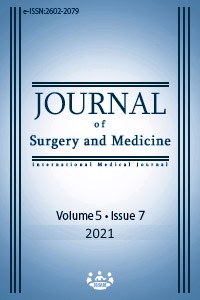The relationship between maxillary sinus retention cysts and nasal septum
Keywords:
Maxillary sinus, Retention cysts, Septum deviation, EtiologyAbstract
Background/Aim: The etiology of re¬tention cysts of the maxillary sinuses (RCMs) and their relationship with the nasal septum is not fully elucidated. This study aimed to investigate the relationship between RCMs and the nasal septum. Methods: In this retrospective cohort study, computed tomography (CT) images of 208 patients who underwent paranasal sinus CT (PNsCT) imaging in our otolaryngology clinic in 2020 were scanned retrospectively. The demographic characteristics of the patients were accessed through the hospital’s electronic data recording system. The ages, genders, RCMs, and nasal septum statuses of all cases were noted. Results: RCM was significantly related to nasal septum deviation (NSD) to the right (P=0.001), while it was not related to NSD to the left (P=0.5). When the nasal septum was in the midline, the risk of developing RCMs was significantly reduced (P=0.007). The direction of septum deviation and the presence of RCMs were significantly related. Right NSD was an independent risk factor for the development of RCMs and increased the risk by 2.2-fold (P=0.002). Conclusion: RCMs, while thought to be asymptomatic and regress spontaneously, should be followed due to the possibility of transformation to antrochoanal polyp (ACP), and surgery should be considered, especially in symptomatic cases.
Downloads
References
Ruprecht A, Batniji S, el-Neweihi E. Mucous retention cyst of the maxillary sinus. Oral Surg Oral Med Oral Pathol. 1986;62(6):728-31. doi: 10.1016/0030-4220(86)90271-9.
Moon IJ, Kim SW, Han DH, Shin JM, Rhee CS, Lee CH, Min YG. Mucosal cysts in the paranasal sinuses: long-term follow-up and clinical implications. Am J Rhinol Allergy. 2011;25(2):98-102. doi: 10.2500/ajra.2011.25.3567.
Wang JH, Jang YJ, Lee BJ. Natural course of retention cysts of the maxillary sinus: long-term follow-up results. Laryngoscope. 2007;117(2):341-4. doi: 10.1097/01.mlg.0000250777.52882.7a.
Albu S. Symptomatic maxillary sinus retention cysts: should they be removed? Laryngoscope. 2010;120(9):1904-9. doi: 10.1002/lary.21040.
Şahin E, Songur MS, Kantekin Y, Bayhan HA, Can IH. Effect of Deviated Nasal Septum on Choriodal Thickness. J Craniofac Surg. 2020;31(5):e439-42. doi: 10.1097/SCS.0000000000006374.
Akbulut A, Demirel O. Nazal septum deviasyonu ve konka bulloza ilişkisinin konik işinli bilgisayarli tomografi ile değerlendirilmesi. Selcuk Dental Journal. 2019;6(4):31-6.
Külekçi S, Kalaycık EÇ, Naiboğlu B, Meriç K,Doğaner E, Sheıdaeı S. Computed tomography analysis of concomitance of concha bullosa, septal deviation and maxillary sinusitis. Kulak Burun Boğaz Uygulamaları. 2019;7(3):120-5. doi: 10.5606/kbbu.2019.18894
Avsever H, Gunduz K, Karakoç O, Akyol M, Orhan K. Incidental findings on cone-beam computed tomographic images: paranasal sinus findings and nasal septum variations. Oral Radiol. 2018;34(1):40-8. doi: 10.1007/s11282-017-0283-y. Epub 2017 Mar 27.
Kaya M, Çankal F, Gumusok M, Apaydin N, Tekdemir I. Role of anatomic variations of paranasal sinuses on the prevalence of sinusitis: Computed tomography findings of 350 patients. Niger J Clin Pract. 2017;20(11):1481-88. doi: 10.4103/njcp.njcp_199_16.
Rhodus NL. The prevalence and clinical significance of maxillary sinus mucous retention cysts in a general clinic population. Ear Nose Throat J. 1990;69(2):82, 84, 86-7.
Hadar T, Shvero J, Nageris BI, Yaniv E. Mucus retention cyst of the maxillary sinus: the endoscopic approach. Br J Oral Maxillofac Surg. 2000;38(3):227-9. doi: 10.1054/bjom.1999.0160.
Omezli MM, Torul D, Polat ME, Ayranc› F, Day› E. Does climate affect the presence of retention cysts in the maxillary sinus? ODU Journal of Medicine 2016;3:1–7. ODÜ Tıp Dergisi
Gursoy M, Erdogan N, Cetinoglu YK, Dag F, Eren E, Uluc ME. Anatomic variations associated with antrochoanal polyps. Niger J Clin Pract. 2019;22(5):603-8. doi: 10.4103/njcp.njcp_419_18.
Berg O, Carenfelt C, Silfverswärd C, Sobin A. Origin of the choanal polyp. Arch Otolaryngol Head Neck Surg. 1988;114(11):1270-1. doi: 10.1001/archotol.1988.01860230064025.
Frosini P, Picarella G, De Campora E. Antrochoanal polyp: analysis of 200 cases. Acta Otorhinolaryngol Ital. 2009;29(1):21-6.
Busaba NY, Kieff D. Endoscopic sinus surgery for inflammatory maxillary sinus disease. Laryngoscope. 2002;112(8 Pt 1):1378-83. doi: 10.1097/00005537-200208000-00010.
Stallman JS, Lobo JN, Som PM. The incidence of concha bullosa and its relationship to nasal septal deviation and paranasal sinus disease. AJNR Am J Neuroradiol. 2004;25(9):1613-8.
Aktas D, Kalcioglu MT, Kutlu R, Ozturan O, Oncel S. The relationship between the concha bullosa, nasal septal deviation and sinusitis. Rhinology. 2003;41(2):103-6.
Poorey VK, Gupta N. Endoscopic and computed tomographic evaluation of influence of nasal septal deviation on lateral wall of nose and its relation to sinus diseases. Indian J Otolaryngol Head Neck Surg. 2014;66(3):330-5. doi: 10.1007/s12070-014-0726-2. Epub 2014 May 10.
Yousem DM, Kennedy DW, Rosenberg S. Ostiomeatal complex risk factors for sinusitis: CT evaluation. J Otolaryngol. 1991;20(6):419-24.
Calhoun KH, Waggenspack GA, Simpson CB, Hokanson JA, Bailey BJ. CT evaluation of the paranasal sinuses in symptomatic and asymptomatic populations. Otolaryngol Head Neck Surg. 1991;104(4):480-3. doi: 10.1177/019459989110400409.
Elahi MM, Frenkiel S, Fageeh N. Paraseptal structural changes and chronic sinus disease in relation to the deviated septum. J Otolaryngol. 1997;26(4):236-40.
Kepekçi AH, Dizdar G, Kepekçi AB. Computed tomography analysis of sinonasal anatomical variations and relationship with the maxillary sinus retention cysts. ENT Updates. 2016; 6(2):70-3.
Downloads
- 1748 2455
Published
Issue
Section
How to Cite
License
Copyright (c) 2021 Hakan Dağıstan, Ceyhun Cengiz, İlknur Haberal Can
This work is licensed under a Creative Commons Attribution-NonCommercial-NoDerivatives 4.0 International License.
















